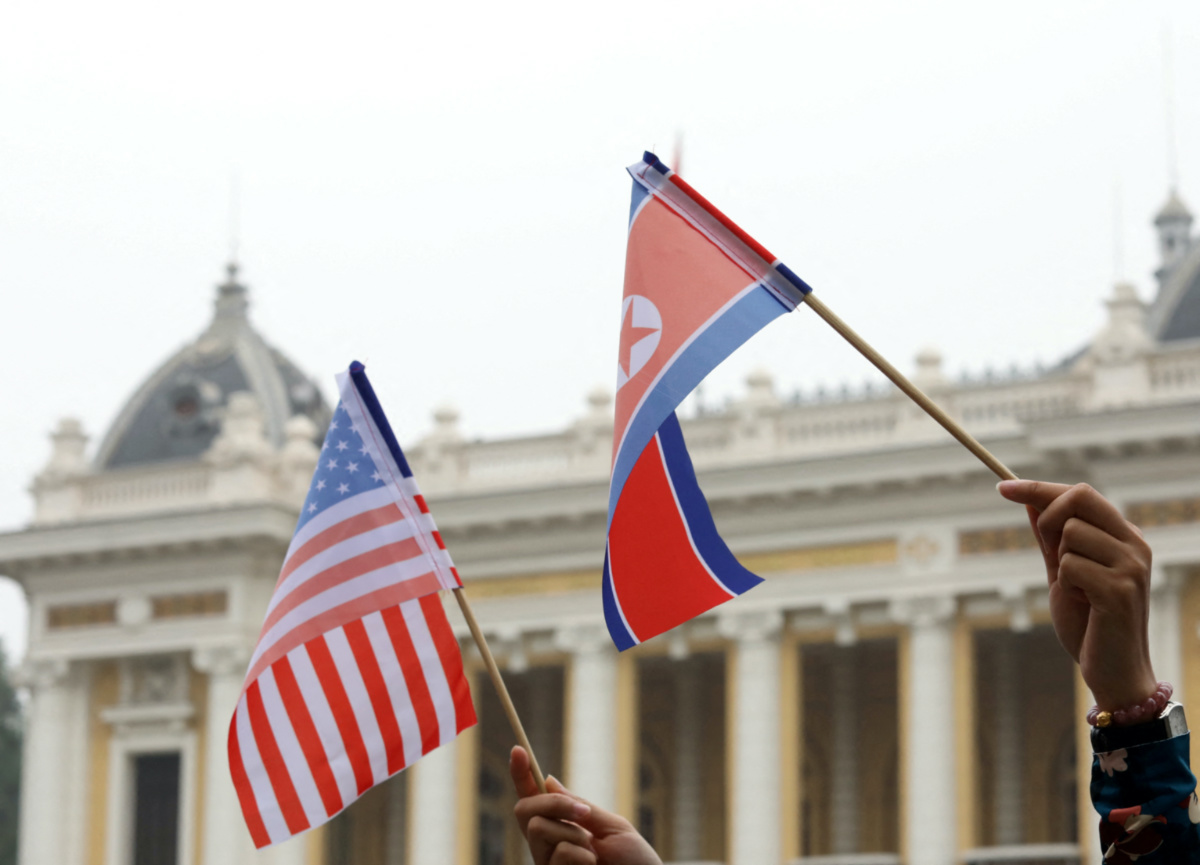United Nations
Reuters
The United States called on North Korea on Monday to defund its nuclear and ballistic missile programs and prioritise the needs of its own people, as Russia and China blamed sanctions for worsening the humanitarian situation in the hermit Asian state.
Russia put sanctions under the spotlight at the UN Security Council as part of its presidency of the 15-member body during February. However, Russia’s UN Ambassador Vassily Nebenzia could not chair the meeting because he tested positive for COVID-19, diplomats said.

Residents hold US and North Korean flags while they wait for motorcade of North Korea’s leader Kim Jong-un en route to the Metropole Hotel for the second US- North Korea summit in Hanoi, Vietnam, on 28th February, 2019. PICTURE: Reuters/Kham/File photo.
“We call on DPRK to demonstrate a commitment to the wellbeing of its own people by respecting human rights, defunding its unlawful WMD [weapons of mass destruction] and ballistic missiles program, and prioritising the needs of its own people – the vulnerable North Koreans,” said the US Ambassador to the United Nations, Linda Thomas-Greenfield.
North Korea’s formal name is the Democratic People’s Republic of Korea. It has been under UN sanctions since 2006 over its nuclear and ballistic missile programs.
In November, Russia and China revived a 2019 push to ease UN sanctions on North Korea in what they described as a bid to improve the humanitarian situation. The move found little support or engagement among council members, so China and Russia have not put it to a vote.
“If the council were to think of ordinary Koreans and not merely geopolitics then this proposal warrants support,” Deputy Russian UN Ambassador Dmitry Polyanskiy told the council. “We believe firmly that the Security Council sanctions apparatus requires a strong dose of humanisation.”
North Korea’s humanitarian situation “continues to worsen,” according to an excerpt of a confidential UN report seen on Saturday by Reuters. The report said that was probably mainly due to Pyongyang’s COVID-19 blockade.
Russia and China also both used the council meeting on Monday to blast unilateral sanctions, without naming names. China’s UN Ambassador Zhang Jun said of such countries: “They have been flinging them about left, right, and center in a frenzy, so much so that they seem to be addicted.”
Thomas-Greenfield said she was concerned by attempts “to criticise and delegitimise” unilateral sanctions as unlawful and that the United States categorically rejects that position.
Meanwhile, a Washington thinktank says it has identified a military base close to North Korea’s border with China that is likely intended for stationing of intercontinental ballistic missiles.
The Center for Strategic and International Studies based its report on satellite images taken on 21st January of the base at Hoejung-ni, in North Korea’s Chagang province about 25 kilometres from the border with China and 280 kilometres north-east of Pyongyang.
“The Hoejung-ni missile operating base will, according to informed sources, likely house a regiment-sized unit equipped with intercontinental ballistic missiles,” the report said.
“Should operational ICBMs not become available in the near term, it is likely that intermediate range ballistic missiles (IRBMs) will be deployed,” the report added, noting that North Korea tested a Hwasong-12 IRBM from Chagang province last month.
It said Hoejung-ni was one of approximately 20 ballistic missile bases that have never been declared by North Korea and that although its construction began 20 years ago, it was one of the latest to be completed.
We rely on our readers to fund Sight's work - become a financial supporter today!
For more information, head to our Subscriber's page.
Analysts say stationing ICBMs so close to China would make any pre-emptive strike against them difficult because of the risk of hitting Chinese territory.
The CSIS report comes after a slew of recent North Korean missile tests that have raised fears that the country may resume ICBM tests. North Korea has suggested it could restart such tests suspended since 2017 because the United States has shown no sign of dropping “hostile policies”.
Asked about the CSIS report, a spokesman for the US defense department, Lieutenant Colonel Marty Meiners, declined to comment on “matters of intelligence or commercial imagery analysis.”
“However, we have been very clear on the threat posed by [North Korea’s] missile programs, and our commitment to the defence of [South Korea], Japan, and the US homeland, and our commitment to uphold regional peace and stability,” he said.
CSIS said there were no signs of an ICBM unit at the base as of January and no protective anti-aircraft positions could been seen within 10 kilometres while the nearest “readily identifiable” surface-to-air missile base was 50 kilometres away.
However, it said its images showed Hoejung-ni to be active and well maintained by North Korean standards and that minor development of its infrastructure was continuing.
The images showed two hardened drive-through missile checkout facilities used for missile arming, fueling, systems checkout and maintenance operations, CSIS said.
Each facility consisted of a large concrete-reinforced shelter cut into the side of the adjacent mountain measuring about 35 metres in length long, sufficiently large to accommodate all known North Korean mobile missile launchers.






